Hello and welcome, my name is Jay. Over the past 10+ years I have built thousands of websites and I want to share everything you need to know about building and running Niche Websites.
Important things like: how to get started, picking a niche, niche website hosting, tips & tricks and what it takes to be successful are all below. So be sure to bookmark this page, it will come in handy to reference it as needed as it has a lot of info.
Here’s a niche website secret: if you can provide the audience and visitors you’re building the information, products and services they are looking for to succeed, you can start building a supplemental or passive income and possibly make a full-time income from you work.

In this massive guide, I’ll show you how to get started and understand the different layers needed for your niche website.
Let’s Get Started…
There are two items every niche website needs right from the start: a domain name and website hosting account. But, before we dive into the details of those, it’s extremely important to start and pick your niche first so that your website’s domain name (URL) will match your selected niche.
Contents
- What Are Niche Websites?
- How To Find A Niche
- Evaluating A Niche
- How Much Do Niche Websites Make?
- Choosing a Domain Name
- How To Setup Hosting For A Niche Website
- How To Install WordPress
- Setting Up and Configuring A Niche Website
- Create Your Niche Website Content
- What It Takes To Be Successful
What Are Niche Websites?
A “niche” refers to a targeted market, special industry or specific interest with profit potential that is not saturated with competitors. Niche websites are typically created for the sole purpose of monetization.
Niche websites usually generate income through digital products, ads, affiliate products, online courses and/or members only areas. Sometimes niche websites can be referred to as affiliate websites or authority websites.
The whole idea is to realize the benefits of building niche websites by finding the niche markets out there that are available and have the least amount of competition so that you can succeed. Even if there is competition in a specific market, you could still potentially succeed by providing better information, services and/or products.
How To Find A Niche
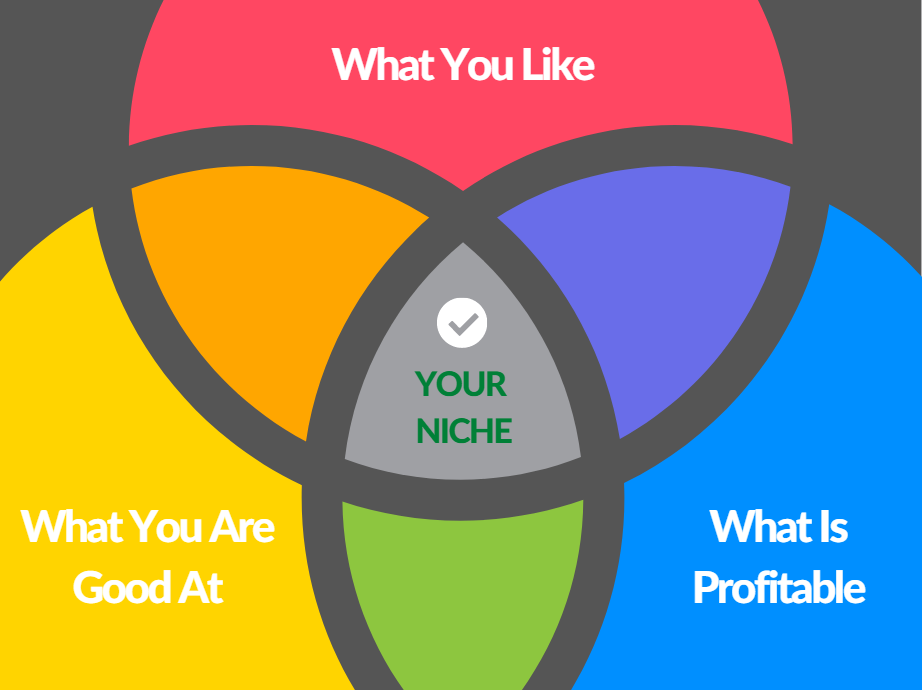
There are many different factors on determining the niche you select but here are some questions to ask yourself to help you during that process.
- What are my interests or hobbies?
- What am I passionate about?
- What things do I want to learn more about?
- Are there products that can be promoted?
- What have I done recently that I enjoyed?
- Is there a problem I can solve?
- Can I create enough content?
- How much competition is out there?
These are just a few examples of questions to start your niche finding quest but there are many more. I find it best to write down several ideas to start with and then narrow them down. Odds are that the first one you come up with may not be the best niche to pursue, so it’s nice to have a few backups.
Evaluating A Niche
Once you have your list of niches, you will want to find profitable keywords to target and make sure that the niche is worth pursuing. This is one of the most important (probably the most important) step as it will increase your chances of having a successful niche website in the future.

There are several handy free tools to find your keywords as well as search stats:
During the selection process of the keywords for your niche websites, there are a few things to focus on.
Search Volume/Demand for Niche Websites Keywords
When researching your keywords and using a keyword tool, it’s best to look at the Exact Match volumes per month of a keyword.
I recommend looking for keywords between 3,000-10,000 local monthly exact searches with a medium to high competition. The competition is the number of Advertisers bidding on a keyword. It is NOT the number of websites competing for a keyword. A higher competition in the Google keyword tool is a good thing.
Keep in mind that there are 3 different types of searches that tools use:
- broad match – Contains all the words, may be in any order, and may include other words
- phrase match – Contains all the words, in order, and may include other words before or after the phrase
- exact match – Contains only these words in this order
Make sure to use Exact Match and be aware that Google and possibly other keyword tools default to Broad Match.
The Power of Long Tail Keywords
If you haven’t heard of the “long tail” phrase, it was made famous by a book written by Chris Anderson. In short, the long tail refers to the statistical graph where the line is skewed to the right without ever reaching zero on the horizontal scale.
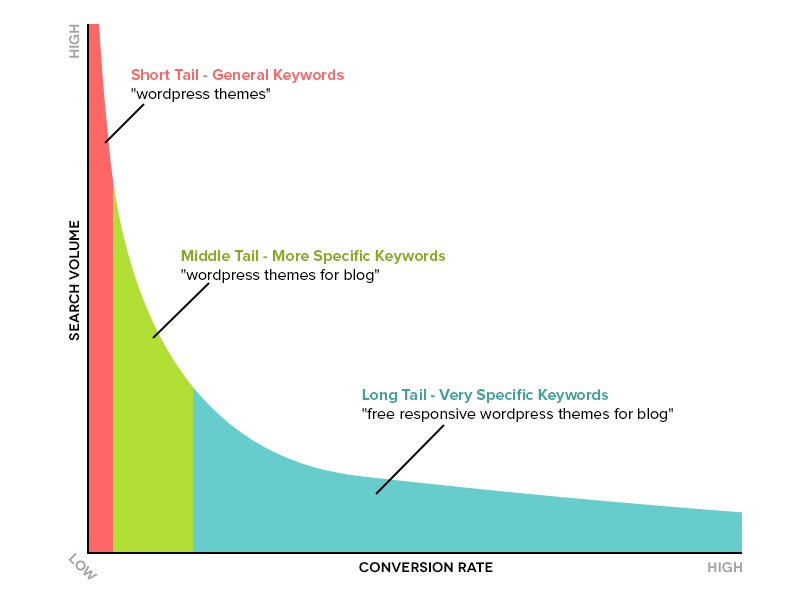
Taking the book into account, lets look at how using long tail keywords and phrases applies to effective search engine rankings and placements.
Effective Use of Long Tail Keywords
Let’s look at an example of what it means to use long tail keywords. For instance, if you’re selling boots, an obvious keyword that you might want to target is “boots”. Therefore, if you’re a small boot seller, you probably won’t have the time or money it would take to get in the top 10 search results for the term “boots”.
But, let’s say that you sell a highly specialized type of boot. For example, you sell boots to people who have had leg, knee or foot injuries. Or, maybe you make custom boots for soldiers or cowboys. I know of several people who only buy custom boots so it’s not unheard of.
Rather than trying to hit a highly competitive keyword like boots, you would want to target a phrase like “custom cowboy boots” or “boots for foot injuries”.
You might be thinking that there’s not enough traffic for these terms to bring you any kind of sales. However, that’s exactly how the long tail process works. As a result, you want a small amount of traffic from a bunch of smaller, less searched keywords.
Let’s say one of your keywords brings 100 website visitors per month. Let’s also say that you have a great website, with great copy, and you’re able to convert 5% of your visitors. Consequently, five people will buy per 100 visitors.
Further, let’s say you have 10 of those long tail keywords. Likewise, each one of those keywords brings in 100 visitors per month. Subsequently, you now have 1,000 visitors per month reaching your website. If we leave the same conversion rate at 5%, as a result, those 10 keywords will net you 50 sales per month.
In other words, the goal as a long tail marketer is to snap up as much as the “little” traffic as possible. Most importantly, don’t try to compete with big-box retailers or medium to large websites.
There are people who are looking for all kinds of niche products and information. It’s your job to look at what you have to offer and to think beyond the obvious keyword terms. There are hundreds, probably thousands, of keyword niches that very few people are targeting.
As you can see, combining effective use of long tail keyword phrases with a solid converting website can help you tap into previously untouched markets, unfilled needs and diversify into hundreds of niche areas if desired.
Earning Potential for Niche Websites
Even when you find your perfect niche, you must be able to profit from it. That’s the whole idea of having the website, right? So there are a few quick ways to determine if the niche you selected could be profitable:
- Google search results shows lots of ads when you search on those keywords
- Are there lots of affiliate products that can be promoted?
- Are there any products/books on Amazon?
- What is the Average Cost-Per-Click of the keywords?
- Is there a product, service or course you could create?
This isn’t a complete list but it should be enough to get started. There are many affiliate programs such as ClickBank, Linkshare, Commision Junction, ShareASale, etc. So think out of the box to find some hidden gems.
Competition for Niche Websites
The next criteria in determining your niche’s potential is the competition you will have to face. There are a few things to look for and consider. Your goal is to get on the first page of Google Search results and the ultimate goal is to be in one of the top 3 spots. There have been numerous studies on the breakdown of what each spots get as a percentage of clicks.
Top spot gets about 53% of the clicks, the second spot gets about 15% and the third gets about 9%.
So, here are a few things to keep in mind when evaluating the level of competition of your keywords:
- Are there a lot of .edu domains in the top spots?
- Do the top spot domain names have your keywords in them?
- Content and size of websites in the top spots.
- Are your keywords used in the Title and Description of the websites?
- Page rank of websites.
- Incoming links to the websites.
Again, this isn’t a complete list but they are important items to consider when doing your evaluation and as you become more experienced at it, you may add other items to your criteria.
How Much Do Niche Websites Make?
The answer to that question will vary, but it primarily depends on how committed you are to making it work and how much effort, time and energy you’re willing to put into it.
Here are a few other factors to keep in mind as well:
- The size of your audience and/or traffic.
- The percentage you receive for each sale of a product or service.
- How successful you are at promoting those products or services to your audience.
There really is no limit on how much you can make with a niche website.
If you’re looking for long-term success with niche websites, you have to be willing to put the effort in to it.
Choosing a Domain Name
A domain name is simply one component of a website however it’s necessary to have so that people can find your website on the web. Think of a domain name as an address (aka URL) which takes someone to a location where your website data files are hosted. Use our Domain Name Finder Tool.
Imagine if you tried to give a person directions to your home but you didn’t have a street name or number. How challenging would that end up being? I don’t imagine it would be really easy to try and do especially when there are numerous homes surrounding you. It’s a very similar idea using a domain name, it directs visitors to your website data files to be served so they can view them.
Choosing the domain name or web address of your niche website should be based on the niche you are considering. The domain name should contain the keyword or keywords of your niche.
For example, you have chosen Fishing as your niche, then you might pick something like FishingTipsAndTricks.com or FLFishingspots.com as your domain name.
Once you have made your decision you will need to register your domain name using a registrar like Name.com or GoDaddy.com. Nowadays many hosting providers like HostGator offer a free domain for a year when signing up for their hosting services.
The only other item we would recommend paying for on the domain name is the “privacy option”. This essentially conceals your personal details from being shown to everyone. It’s not required, however, it’s there if you would like to keep your personal info private.
How To Setup Hosting For A Niche Website
Unless you have your own personal web server setup and sitting beside you, you will require hosting service to store your niche website (website data files).
It’s a crucial part of a niche website or any website.
Without getting too detailed or technical, website hosting is basically the location where your domain name directs traffic to so that visitors can view your information/data on the Internet. It’s also the control center and includes the software or platform you are using to process the files/data, allows you setup email accounts, monitor bandwidth, disk space, traffic details and more.
For example, we use WordPress to build all of our niche websites because it’s easy to install, easy to use and easy to maintain. It’s by far the best & easiest platform to build websites in my opinion and it’s free to use. It also supports thousands of plugins to do just about anything you want.
When it comes to finding a hosting provider for your niche website, the options are almost endless. This is not a complicated task but it can be a tedious one weeding through all the choices out there.
Many have inexpensive rates but they frequently have horrible customer support and/or don’t have standard features.
The best way to select a quality web host is to make sure they have competitive prices, WordPress support (preferably 1-click install so there are no technical skills needed) and great support.
A few examples of those would be HostGator, InMotion and BlueHost.
Most importantly, after using many hosting services on the internet the last 10 plus years, I always recommend using HostGator to anyone who asks my advice for hosting a website.
There’s no question with the large list of unlimited standard services they offer with their hosting packages that the value is there. Having unlimited bandwidth, transfer data storage, email accounts and more is a serious bonus for small to medium size websites.
They have one-click installs for the most popular content management systems (CMS) like WordPress! HostGator has one of the best support departments, if not the best. They also provide monthly, bi-annual, annual and multi-year plans.
Therefore, if you click on the link HERE or above, it will take you HostGator’s website to receive a discount on hosting. As a result, I will get a small commission (not extra cost to you) after you decide to sign up for there hosting services.
Once you are at HostGator’s site, I recommend the Baby Plan as it’s the best plan for the money and includes a free domain.
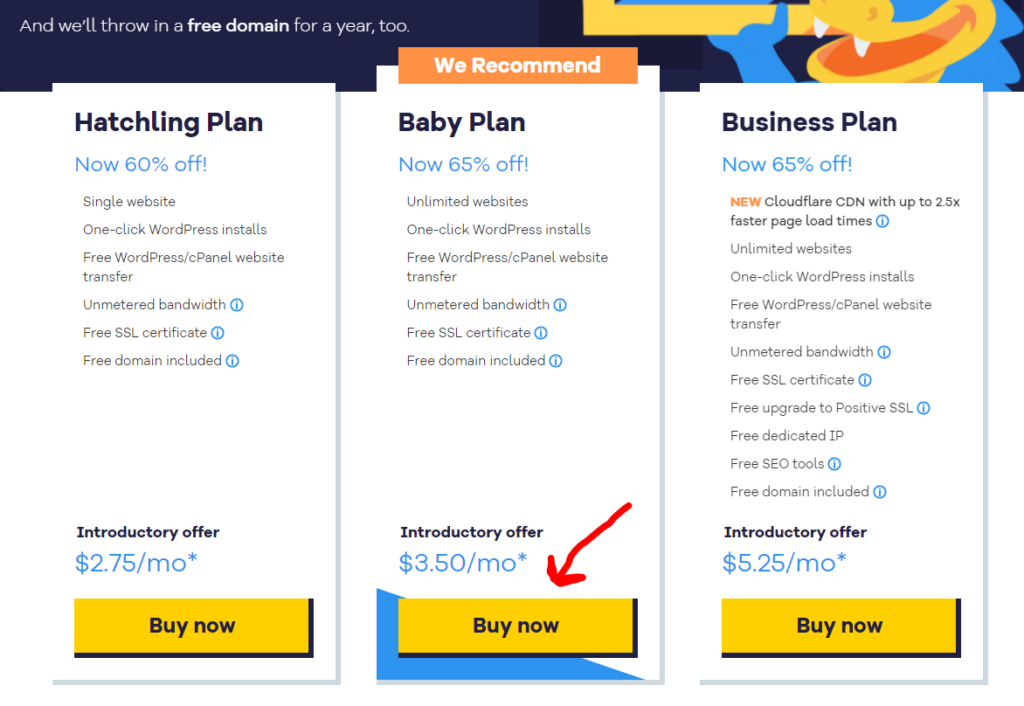
After clicking the Buy now button, you will be taken to the signup page where you can enter your desired domain name and select the billing plan cycle. I would recommend the 12 months but it’s completely up to you on how often you want to renew and the discount you would like.
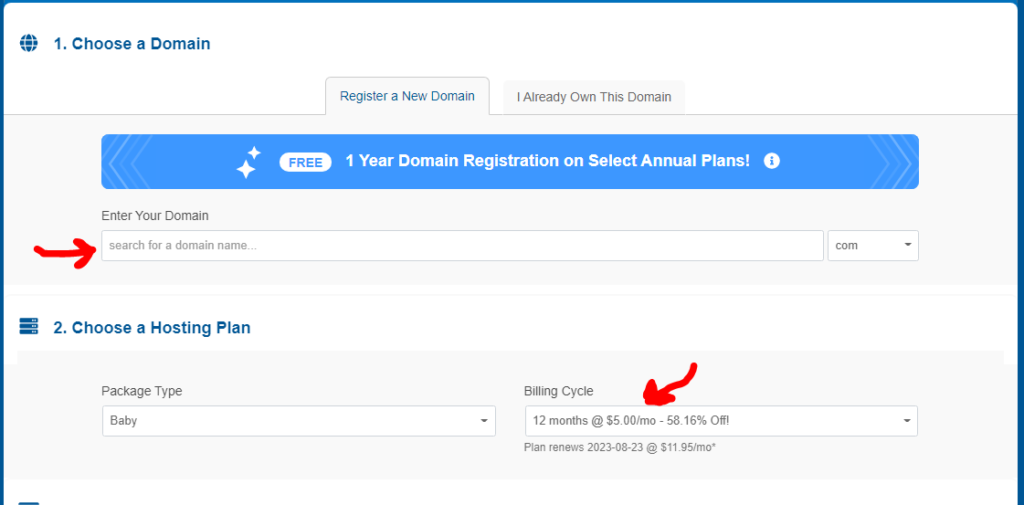
In the next section “Add Additional Services”, I recommend unchecking all options. Every one of those options are fluff and are NOT necessary in my opinion.
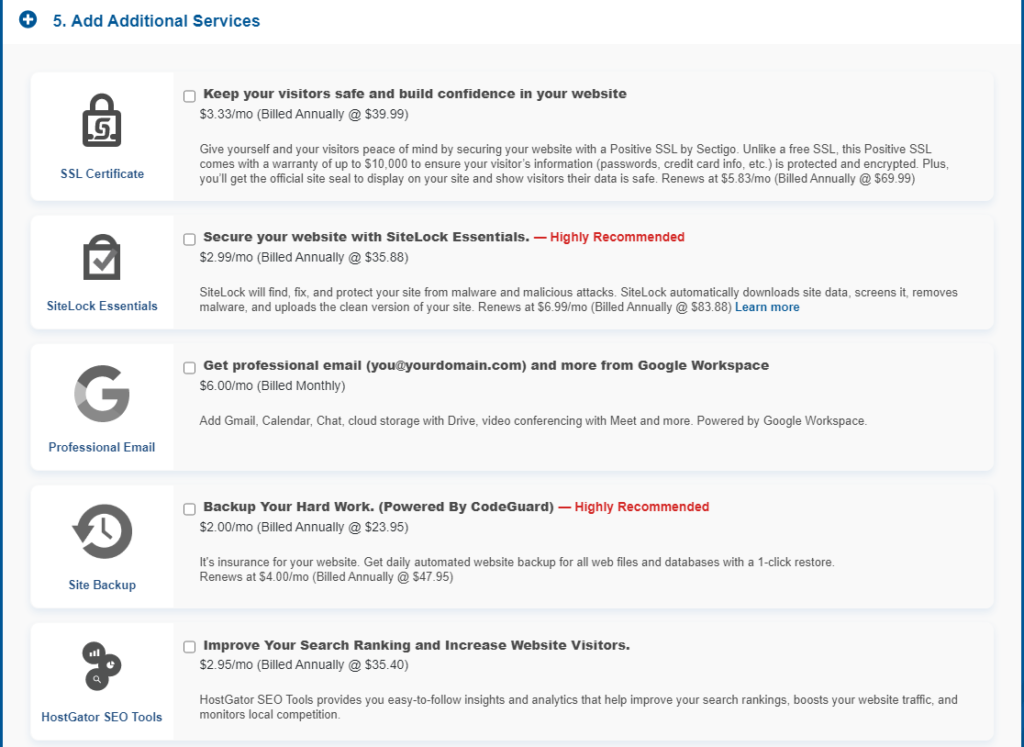
Scroll to the bottom of the page and review your order details and when ready click the Checkout Now! button. Usually within 10-20 minutes you will receive an email with all the information and instructions to access your hosting account. Pretty simple!
How To Install WordPress
Installing WordPress with One Click is simple and easy. Watch the short video below when you are ready to install WordPress for your niche website.
Setting Up and Configuring A Niche Website
Once WordPress is installed, you will probably want to change the default look of your website. There are thousands of free and paid themes available for WordPress. You can do a search in WordPress to find one that suits your needs.
It is very simple to install a theme on WordPress. First, log into your website’s administrator panel. Second, click the Appearance menu item on the left hand side.
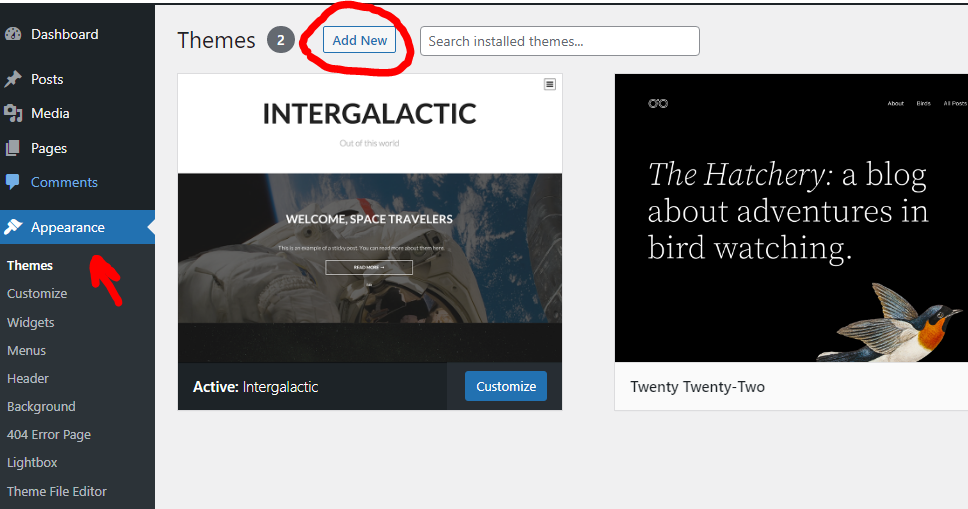
Next, click the Add New button to show all available themes. Last, click the Install button on the desired theme.
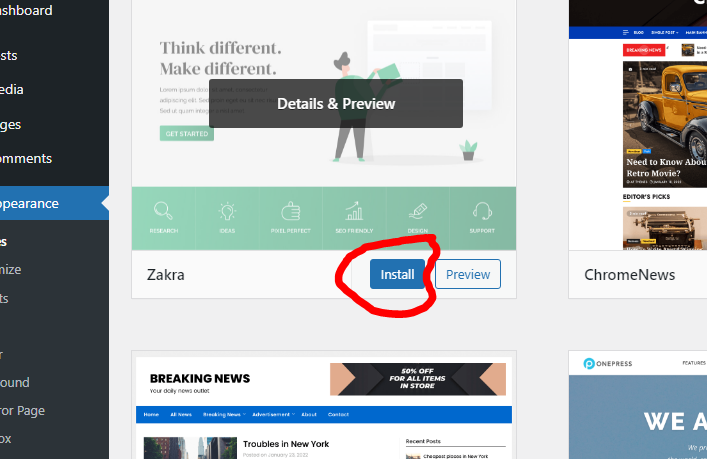
Last, configure the website by using the menu items under Appearance.
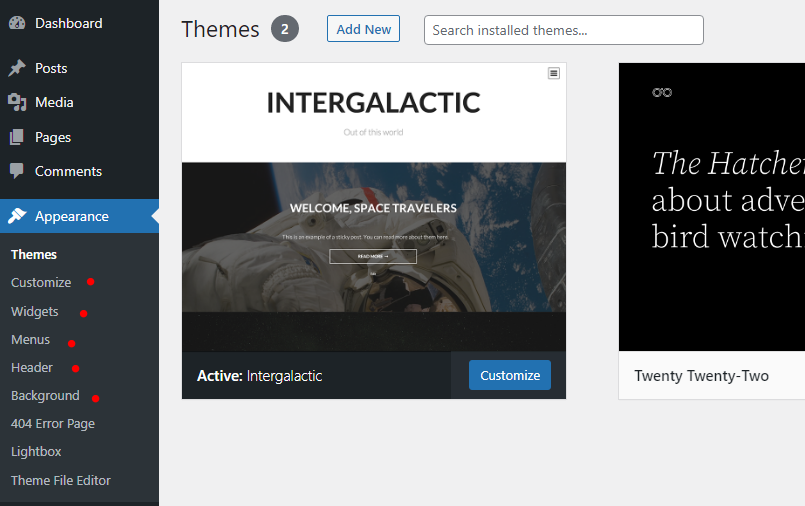
Adding extra functionality or features to your website is simple too. Chances are a plugin has already been built that can do what you want.
Searching for and installing plugins is snap by clicking on Plugins -> Add New on the left hand side menu.
Here are a few plugins I recommend installing on any new niche website.
Remember, the trick is to keep your niche website simple so try to keep the number of plugins installed to a small number.
All of these are available through the WordPress plugin dashboard.
- All-In-One SEO
- Essential for SEO and easy to use.
- Wordfence Security
- Includes an endpoint firewall and malware scanner that were built from the ground up to protect WordPress.
- Really Simple SSL
- Automatically detects your settings and configures your website to run over HTTPS
- Google XML Sitemaps
- This plugin generates a sitemap for your website and also updates it when changes are made.
- TubePress
- Easily integrate YouTube Videos into your website.
Create Your Niche Website Content
Now that you have your website installed and configured, it’s time to get it populated with content.
Firstly, writing articles based on your niche keywords will help build search engine traffic over time. Secondly, you should start looking at populating the content and website with affiliate products, programs or your own products and services related to your niche.
Here’s a not so secret, niche website secret: Content, Content, Content!!!
The secret is, Quality Content and lots of it, OK so it’s really not a secret, as Google has said this for years, but it’s still very important to mention.
A great way to create content for your niche website is to use long tail keywords. Make sure to use them in the titles, descriptions and keywords of your posts.
If you are struggling to get new content ideas perhaps you could try the following:
- Subscribe to Blogs and News Websites in your Niche with an RSS Reader.
- Ubersuggest.org – With this free keyword tool you can instantly get thousands of keyword ideas from real user queries! Use the keywords to get inspiration for your next blog post.
- Analyze content that your competitors created with Open Site Explorer to find out what types of content were linked to or shared the most.
- Search discussion forums or social media platforms.
- Ask your Audience to see what types of problems they are facing or what they want to know more about.
Once you have a list of content ideas it’s a good idea to create a schedule. Therefore, depending on how many niche websites you plan to manage it’s important to be organized. Moreover, if you outsource your content creation to others in bulk, make sure that you schedule your content to go out at interval times.
What It Takes To Be Successful

The Right Mindset
When starting out as a complete newbie in the online arena, it’s very likely to become frustrated at some point. So, to compensate, you need to have a positive attitude. It’s very important to believe in yourself and have faith that you too can learn the skills necessary to do this. It’s key, that you need to be in the learning mindset to succeed.
Patience is Key
Although building a website is relatively quick and using a turnkey niche website is even quicker, the process of gaining traffic to it takes time and a consistent effort. Therefore, don’t expect to be flooded with visitors the day after you have your website up or for it to rank Number 1 on Google for your chosen term within a week. Getting your website ranked well in the search engines takes work and patience, but the rewards can last for years.
Perfection is not Necessary
Don’t waste your time fussing over the ‘little things’ and making sure everything is perfect before you begin promoting your niche website! The things you should be spending time on is getting traffic to your website – without traffic, NOTHING ELSE MATTERS.
In other words, if there’s a tiny spelling mistake, a product photo isn’t the best, a product you sell is out of stock – all that is irrelevant unless you have people visiting your website!
Consistency, Consistency, Consistency
When your website is up and running, it needs consistent TLC to be strong and healthy. You need to do your keyword research and get busy link building one way or the other to get traffic coming in.
Start chatting in your niche related forums, get posting intelligent comments in blogs, start creating a buzz around your new website and probably the most important item is to constantly add fresh content to your website.
Doing this takes time but it slowly starts adding up and you will eventually see traffic coming to your website.
Going to the Next Level
Once the niche website has good traffic and getting regular sales/signups then there are really only a few things you need to do to take it to the next level:
- Get more traffic
- Improve the conversion rate
- Increase product/services
- Keep adding content
You can use the money you are making from the niche website to plough it back into making all of the above happen.
The Possibilities are Endless with Niche Websites
If you’ve made it this far in the post, then you’ve taken an exciting peak into niche websites!
Hopefully this gives you some idea of what you need to do to be successful with a niche website. Although it all seems a lot of hard work, it is actually fun (especially when your in a niche that you have interest in) and you will learn so many new skills that you can use to repeat additional websites.
Remember, nothing happens without action and that’s the real “secret” – make sure you are busy doing the right things that matter.
If you’re ready to get started and need a quick start, checkout our professionally designed turnkey niche websites and go for it!

